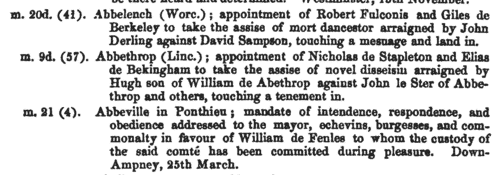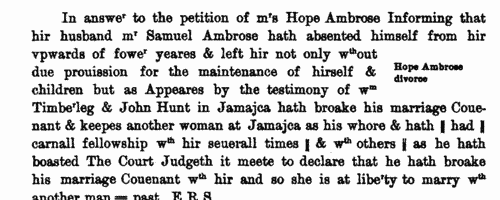Bouden Surname Ancestry ResultsOur indexes 1000-1999 include entries for the spelling 'bouden'. In the period you have requested, we have the following 20 records (displaying 1 to 10): Single Surname Subscription | | | Buying all 20 results of this search individually would cost £122.00. But you can have free access to all 20 records for a year, to view, to save and print, for £100. Save £22.00. More... |
These sample scans are from the original record. You will get scans of the full pages or articles where the surname you searched for has been found. Your web browser may prevent the sample windows from opening; in this case please change your browser settings to allow pop-up windows from this site. Patent Rolls: entries for Leicestershire
(1278-1279)
Calendars of the patent rolls of the reign of king Edward I are printed in the Calendars of State Papers: but these cover only a fraction of the material on the rolls. From 1881 to 1889 the reports of the Deputy Keeper of the Public Record Office also include calendars of other material from the rolls - about five times as many entries as in the State Papers - predominantly mandates to the royal justices to hold sessions of oyer and terminer to resolve cases arising locally; but also other general business. The calendar for the 7th year of king Edward I [20 November 1278 to 19 November 1279], hitherto unindexed, is covered here.BOUDEN. Cost: £6.00.  | Sample scan, click to enlarge

| Close Rolls
(1302-1307)
The close rolls of the 31st to 35th years of the reign of king Edward I, that is to the day of his death (7 July 1307), record the main artery of government administration in England, the orders sent out day by day to individual officers, especially sheriffs of shires: they are an exceptionally rich source for so early a period. In amongst this official material, the rolls were also used as a way of recording many acknowledgments of private debts and contracts between individuals. Most of the contents relate to England, but there are also entries concerning Wales, Scotland, Ireland and the English possessions in France.BOUDEN. Cost: £4.00.  | Sample scan, click to enlarge

| Grantees of offices, commissions and pardons
(1317-1321)
The Patent Rolls are the Chancery enrolments of royal letters patent. Those for the 11th to the 14th years of the reign of king Edward II (8 July 1317 to 7 July 1321) were edited for the Public Record Office by G. F. Handcock, and published in 1903. The main contents are royal commissions and grants; ratifications of ecclesiastical estates; writs of aid to royal servants and purveyors; and pardons. Most extensive are the commissions of oyer and terminer to justices to investigate complaints about specific crimes and wrongs in particular counties.BOUDEN. Cost: £2.00.  | Sample scan, click to enlarge

| Devon and Cornwall clerks, clerics, monks and clergy
(1370-1382)
Ordinations to first tonsure, acolytes, subdeacons, deacons and priests, from the register of bishop Thomas de Brantyngham of Exeter. Exeter diocese covered the counties of Cornwall and Devon. Some of these clerks would go on to obtain benefices and remain celibate. The lists of subdeacons, deacons and priests state the clerks' respective titles, i. e., give the names of the person or religious house undertaking to support them. Monks and friars ('religious') are bracketed separately as such.BOUDEN. Cost: £6.00.  | Sample scan, click to enlarge

| Lichfield Diocese Ordinations: Deacons Secular
(1508)
The diocese of Coventry and Lichfield at this period included the whole of Cheshire, Staffordshire and Derbyshire; all Lancashire south of the Ribble; northern Shropshire (including Shrewsbury); and northern Warwickshire (including Birmingham and Coventry). Ordinations took place on the four Ember Saturdays in the year, and on certain other occasions; lists of ordinands to the degrees of acolyte, subdeacon, deacon and priest were preserved in the ordination registers, a distinction being made between those clerks who were 'regular', i. e., monks, friars, &c., and those who were 'secular', the main body of the clergy. All ordinands were celibate, and those regular, and the secular who obtained benefices, remained so, but only a minority of the secular ordinands ever obtained benefices, and most will doubtless have married later in life. No man might be ordained to subdeacon or higher without proving either that he was of independent means or that he was sponsored by an institution or a gentleman. Most entries in the register of such ordinations therefore have the words 'ad titulum' followed by the name of the religious house that was the sponsor. This is an important indication of the man's origins - boys whose families were monastic tenants, and who were educated by the monks, would naturally be sponsored by the abbey. Only men who were born and bred in the diocese could be ordained by the bishop, unless producing letters dimissory from the bishop of the diocese of their birth. These are the ordinations celebrated on Ember Saturday, 23 December 1508, by Thomas bishop of Panados (Pavados), suffragan of bishop Geoffrey Blythe, in Lichfield cathedral.BOUDEN. Cost: £8.00.  | Sample scan, click to enlarge

| Liegemen and Traitors, Pirates and Spies
(1625-1626)
The Privy Council of Charles I was responsible for internal security in England and Wales, and dealt with all manner of special and urgent matters
BOUDEN. Cost: £4.00.  | Sample scan, click to enlarge

| Besiegers of Colchester
(1648)
The siege of Colchester was one of the most severe of the Civil War, and lasted from 14 June to 28 August 1648. Kent and Essex Royalists on their way into Norfolk and Suffolk turned aside into Colchester, hoping to get recruits there. Fairfax pursued from his headquarters in London, and when on 12 June he appeared with 5,000 men they were obliged to make hasty preparations for defence. The town was ill-fitted to stand a siege, and the 4,000 Royalist troops were most of them newly levied and ill-armed, but after a repulse on 14 June 14, Fairfax realized that a long siege was inevitable, and busied himself with raising forts to completely isolate the town. On 2 July the work of circumvallation was finished, and though meeting with fierce resistance, Fairfax gained post after post. Early in August famine added to the misery of the besieged, and the citizens began to clamour for surrender. On 19 August, Norwich, the Royalist leader, asked for terms; negotiations went on for some days, and finally on 28 August, Fairfax occupied the town. Three of the Royalist leaders were shot, and the soldiers were sent to labour in the West Indies, or to enforced military service under the Venetian Republic. The townsmen were made to pay a heavy fine.
These accounts list disbursements to workmen digging the fortifications and to artificers, soldiers and officers involved in the siege. The total sum paid was about £1,695.
BOUDEN. Cost: £4.00.  | Sample scan, click to enlarge

| Allegations for marriages in southern England
(1660-1669)
The province or archbishopric of Canterbury covered all England and Wales except for the northern counties in the four dioceses of the archbishopric of York (York, Durham, Chester and Carlisle). Marriage licences were generally issued by the local dioceses, but above them was the jurisdiction of the archbishop, exercised through his vicar-general. Where the prospective bride and groom were from different dioceses it would be expected that they obtain a licence from the archbishop; in practice, the archbishop residing at Lambeth, and the actual offices of the province being in London, which was itself split into myriad ecclesiastical jurisdictions, and spilled into adjoining dioceses, this facility was particularly resorted to by couples from London and the home counties, although there are quite a few entries referring to parties from further afield. The abstracts of the allegations given here usually state name, address (street in London, or parish), age, and condition of bride and groom; and sometimes the name, address and occupation of the friend or relative filing the allegation. Where parental consent was necessary, a mother's or father's name may be given. The ages shown should be treated with caution; ages above 21 tended to be reduced, doubtless for cosmetic reasons; ages under 21 tended to be increased, particularly to avoid requiring parental consent; a simple statement 'aged 21' may merely mean 'of full age' and indicate any age from 21 upwards. These are merely allegations to obtain licences; although nearly all will have resulted in the issuing of the licence, many licences did not then result in marriage. BOUDEN. Cost: £4.00.  | Sample scan, click to enlarge

| Suffolk householders
(1674)
Hearth tax was raised by assessing each householder on the number of chimneys to the dwelling. This provided a simple way to make a rough judgment as to the value of the dwelling: paupers were issued exemption certificates, but they too were listed at the end of each return. The returns were made by township, grouped by hundred. A complete copy of the hearth tax return for each shire was sent to the Exchequer: this is the return for Suffolk for Lady Day (25 March) 1674 (E 179/257/14) as printed in 1905 as Suffolk Green Book no xi, vol. 13. The numbers given are the numbers of hearths: where two or more people are grouped together with one number, it may be assumed that they were heads of separate households sharing a single building with that number of chimneys.BOUDEN. Cost: £6.00.  | Sample scan, click to enlarge

| Massachusetts Criminals, Litigants, Lawyers and Jurors
(1673-1692)
The only surviving complete volume of the records of the courts held by the Governor and Assistants of the Colony of the Massachusetts Bay is for the period 1673 to 1692. It was transcribed by John Noble, and published by order of the Board of Aldermen of the City of Boston, New England, as County Commissioners of the County of Suffolk, Massachusetts. Under English law overseas colonies were generally deemed to fall under the jurisdiction of the Admiralty, and were subject to English law varied by local circumstances. These Courts of Assistants therefore also function as Courts of Admiralty; the courts had jurisiction over criminal cases and also in civil disputes between parties. In practice, many of the names that occur in the record are just those of the members of the grand jury and the lesser juries (appointed from among the adult male householders of the colony) before whom the cases were tried.BOUDEN. Cost: £4.00.  | Sample scan, click to enlarge

|
| 1 | 2 |  |
Research your ancestry, family history, genealogy and one-name study by direct access to original records and archives indexed by surname.
|












